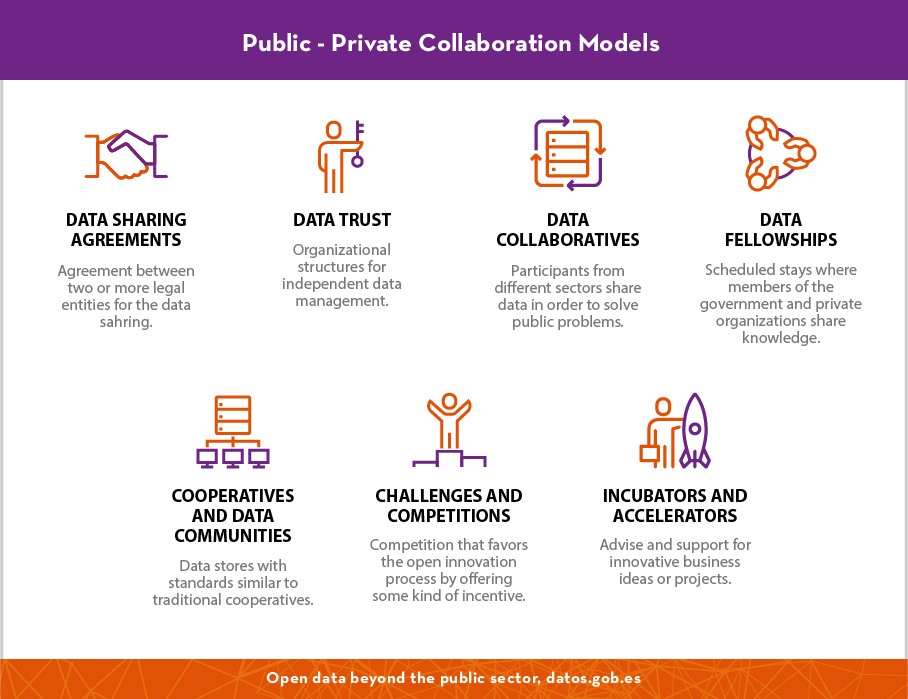Open data beyond the public sector
Fecha del documento: 17-03-2020

From its origins, the open data movement has been focused on opening up public sector data, and even the original statement of open data principles itself refers only to data from public administrations (open government data - OGD). However, this perception has evolved and today it is more common to speak of open data in a more general scope that includes all sectors, as demonstrated for example by the declaration of open data principles promoted more recently by the Open Data Charter, the wording of which is perfectly applicable to any sector.
On the other hand, while we now have a more than respectable and valuable amount of data available in open format from government, there are also some limitations with regard to governance and sustainability models for public data which, together with the remaining challenges of digital transformation in the sector, are to some extent limiting the ultimate availability of data. Data lifecycle management, technical and legal issues, adapting the skills of public employees or growing concerns about potential privacy issues are some of the barriers that public administrations have to face when trying to take their open data projects to the next level.
In this context, other data-producing sectors are also emerging as complementary sources to the hundreds of open data catalogues that governments have been publishing in recent years. These new data come from other publishers outside the public sector - such as the private sector, academia or the so-called third sector - all of them driven by different motivations and by the potential benefits associated with social reputation, innovation or attracting talent, among others. Even citizens themselves have now become a broad source of data, albeit sometimes unwittingly.
Thanks to this greater variety of data producers, the possibilities of enriching information by combining the different sources now available are increasing, but, at the same time, there is also a new need to improve coordination and integration between all parties in order to enable more efficient production and reuse of data and thus obtain the expected improvements in the social, economic and scientific spheres. The current challenge is therefore to find new models and collaborative relationships between the different parties that provide an adequate response to the existing challenges in achieving better management and availability of data, ultimately benefiting all parties and facilitating its reuse to a greater extent.
In order to get a more complete picture of the situation and to understand in more detail who these new data-producing sectors are, what their motivations are and what new models of collaboration are emerging between them, this report is divided into two parts:
![]()
In the first part of the report we will take a look at the different data producing sectors - leaving the public sector aside for a moment - and the alternative data sources they offer us, showing their motivations, their particularities and several examples.
![]()
In the second part of the report we will focus on analysing what models of collaboration can emerge between the public sector and other sectors to create joint actions to improve the governance, availability and ultimate re-use of data, showing again the differences and similarities between each of them and different examples of how they have been put into practice so far.

From the experimental vision of contests and competitions, to the purely entrepreneurial objective linked to the launch of incubators. From the models related to the legal responsibility point of view of data trusts, to the participative models of data collaboratives. From the actions with a more formative perspective of data fellowships, to the proposals aimed at empowering data cooperatives. All of them are possible models, some of them in a preliminary phase of consolidation but others more tested and refined, that can be more easily adopted. Let's discover them in this report and see how they can be put into practice in different contexts.
Documentation
- Presentación: Datos abiertos más allá del sector público (only available in Spanish)pptx2.02 MB
- Resumen ejecutivo: Datos abiertos más allá del sector público (only available in Spanish)docx229.14 KB
- Datos abiertos más allá del sector público: publicadores, motivaciones y modelos de colaboracióndocx8.62 MB











